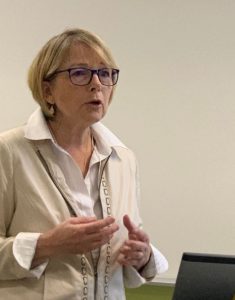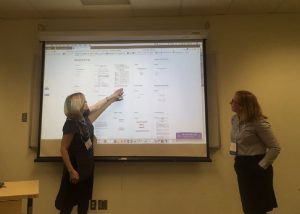The first Canadian Symposium on Academic Integrity took place in April 2019, bringing a sell-out crowd to Calgary in Alberta, Canada to discuss academic integrity. The symposium aimed to raise awareness of academic integrity challenges in Canada, along with sharing the current research being undertaken, with many findings being presented for the first time.
I delivered a new presentation and also chaired the parallel session on contract cheating, which was a major theme of the conference. Tracey Bretag also attended to present two keynotes, including a brand new talk considering how approaches to academic integrity had developed differently around the world.
Here are some of the findings from the symposium sessions I attended that are worth further circulating. There was lots of good material that I’ve seen presented in different forms before, so I’ve tried to focus this post on areas that are likely to not likely be widely known about.
Findings From The Canadian Symposium on Academic Integrity
The contract cheating industry is manipulative – and workers don’t always realise they’re employed as part of the contract cheating industry

Corinne Hersey talked about her experiences accidentally working for contract cheating services. She had been employed working for what she thought was a question and answer site. Questions could come in at any time and very quick answers were expected. It turned out that the answers were going straight to students, either as short homework questions, or to be used as part of a live online examination process.
Corinne also gave an example of how contract cheating services are hiring editors to take what may be poor quality essays and to improve them. The individuals being hired think they’re just working on lower quality work produced by a student.
Academic integrity has developed its own set of communities – but those people looking to subvert academic integrity have developed their own communities too
Tracey Bretag talked about the ways in which communities of practice had developed around the world, often in different geographic locations. This included in areas of the world where getting a community developed could be difficult, for example in Latin and Central America. Communities had even begun to develop where interest in academic integrity had emerged from different directions, for example the UK had originally become interested in academic integrity based on the technical problem of detecting plagiarism.
That move is positive, but I shared some less desirable developments in my talk, including showing the online communities set up by contract cheating services to help their writers, as well as independent writer communities not connected with any particular contract cheating service. I also demonstrated that some of these communities aimed at contract cheating service writers are now moving offline, with conferences being held for them in the same way that the academic integrity community holds its own conferences.
Many staff don’t actually know much about contract cheating and academic integrity
This was demonstrated in James Blackburn’s presentation. James had purchased an essay for £70, but educators thought that it must have cost up to £600. When James quizzed his participants he found out that academics knew very little about the contract cheating industry or how it had developed.
Tracey Bretag recommended that staff were supplied with access to academic integrity training, such as the training we developed in conjunction with Epigeum.
Staff did not seem to know that wide range of assessment types could be outsourced. I showed many examples in my presentation, based on my own searches for information about this field. But Tracey found that even authentic assessments could be outsourced. She suggested that this might be be because students were unsure how to approach unfamiliar assessments like this and so more scaffolded and nuanced support would be necessary.
The contract cheating industry is developing a hidden side – includes new ways of operating and the move to new markets
The hidden side of contract cheating includes the involvement of companies and the operating of individuals.
One case study presented by participants from across Calgary saw discussion of when a father had written versions of an assessment for both of his twin girls. Although written separately, the end results were still similar enough to rise suspicion. This ties in with the research that Tracey Bretag presented, showing that the majority of contract cheating goes through friends and family rather than commercial services.
Roswita Dressler and Sarah Eaton talked about their work on the non-English language side of contract cheating. There has been little attempt to study these sites. They showed one essay mill aimed at the Canadian market which would provide solutions in both English and French. They also showed that essays and academic work could be purchased in a wide variety of languages.
A new business model being used by contract cheating services looking to cut their costs was presented by Corinne Hersey. She found that contract cheating providers were outsourcing work to low cost writing services, not always with English as their first language. The end results were then sent to an editing service to correct the language and improve the arguments. Presumably using this two stage process gave better results and reduced the overall costs, leaving more profit available for contract cheating providers.
Note-sharing sites offer future threats – and students do not always see using these as breaching academic integrity

The issue of note-sharing sites (also referred to as “pay to pass”) came up multiple times during the symposium, including in my own presentation. These are the sites set up where students can share notes, assessments and resources from the courses they are studying, often being made to feel that they are part of a community helping other students. As Tracey Bretag’s research suggested, few students think that using these sites, either by sharing material themselves or accessing shared material, is a form of cheating. The whole use of the term “sharing” makes this sound as though it is something positive.
The idea of sharing resources is not new. The old days of university fraternities allegedly saw these groups keeping boxes of previous assessments, designed to help the frat members to succeed with little effort. And many students groups have their own agreements to share materials. But these sites are often breaching copyright and the intellectual property of the people creating the resources, as well as tempting students to cheat by providing access to previous solutions. But it is apparently very hard to get materials taken down once they are placed online.
The viral methods used by note-sharing sites to get content were discussed. This included students being required to upload resources themselves to get access to other resources for a limited time (or alternatively paying a fee, a seemingly less inviting proposition for students). Many students did not seem to realise that their name would often be visible with the resources they uploaded.
Some attendees seemed surprised and unaware that sites like this exist. A live demo for one such individual undertaken during the conference saw 40 documents relating to his course available online, including solutions.
We Need To Continue With Our International Work
It is really positive to see the continued work on academic integrity taking place around the world, including in Canada. This post gives just a flavour of the many initiatives that are happening.
Note-sharing sites do offer a threat and we need to continue to make students aware that they shouldn’t be sharing university intellectual property with such sites. They are part of an advanced, always developing and manipulative contract cheating industry, all profiting off by encouraging students to breach academic integrity.

